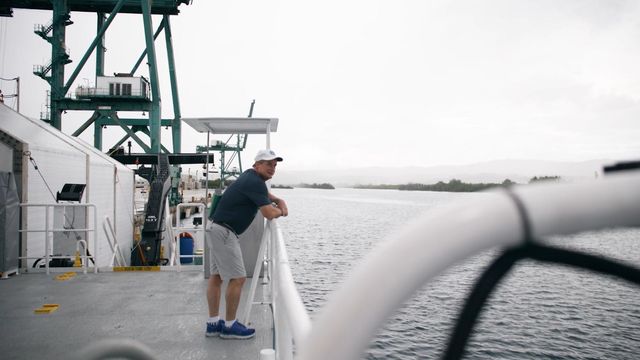UNC prof and world (and space) traveler explores the deepest point on Earth
From traveling to space and going to the deepest point on Earth, University of North Carolina at Chapel Hill professor has had a busy year.
Posted — UpdatedHis latest adventure took him in the opposite direction. Kitchen has just returned from a trip to the Mariana Trench, which is the deepest oceanic trench on Earth.
A last-minute cancelation gave Kitchen the chance to go on one of the last trips in the submarine since the owner recently sold the vessels.
"This was going to be the last opportunity for anyone like me to go down for what could be a decade, perhaps even longer, because this is the only full ocean depth submarine that is available to go down to 36,000 feet," said Kitchen.
Into the abyss
At the beginning of July, Kitchen headed to the Mariana Trench, located near Guam, for the excursion of a lifetime.
"I went on July 4. When everyone was watching fireworks, I was heading into the deep abyss," said Kitchen.
The trip down to the trench is about four hours, Kitchen said.
"It's a fascinating place because, after about 1,000 feet, there is zero sunlight," said Kitchen.
While above water, temperatures are summer-like and warm, the water surrounding Kitchen was quickly plummeting in temperature.
"When you get down, it is cold – one degree above freezing," said Kitchen. "I had my gloves ... I had a fleece flannel on. I had my flight suit and Carolina hat. It's cold, and no one thinks the bottom of the ocean is cold but it's really cold."
Thriving under pressure
"So you've got salt water, no sunlight and these crushing pressures, and yet, things still survive down there and they don't just survive, they thrive."
One type of animal that especially thrives in the deepest points is an arthropod, a group of invertebrates with a segmented body and a shell. Earthbound examples are some insects, spiders and other arachnids and crustaceans.
In the deep, Kitchen said, "They, and other species like them, they actually grow a really strong shell. There's a lot of shell to that, and very little animal ... they have all these things kind of working against them, but yet, they thrive," said Kitchen.
Kitchen said the other captivating thing he saw was bacterial mats that are chemosynthetic, meaning they use chemicals to survive.
"Here I am in this little titanium ball at the bottom of the ocean, and I have this epiphany that I'm looking at these things and like, this is what lives on other celestial moons or on other planets. If we were to go to Jupiter's moon, that is likely what would be living there," he said.
'Just as exciting as going to space'
Kitchen said he didn't think any other adventure he went on would come close to going to space. But his trip thousands of feet into the ocean changed that.
"To me, that was as exciting as going to space. I loved every bit of that ... when I got back on board the ship, I was effusive, and I still have it now,"said Kitchen.
"It was a once in a lifetime thing," he said.
Some of the items he brought along in space, he also took to in the submarine.
"I did bring my passport that I had stamped in space and [it] was stamped and signed at the very bottom of the ocean," said Kitchen, adding that he also brought flags of the United States and Ukraine.
Next on the agenda
While Kitchen, who has also traveled to all 193 United Nations recognized countries, believes the exploration is exciting, at his core he is an educator.
"I love teaching my students to push through boundaries and that anything is possible," he said.
Up next on Kitchen's agenda are a few family vacations and preparing for the upcoming fall semester at UNC-CH. But just like he tries to teach his students to push boundaries, Kitchen alludes to more adventures being planned.
Related Topics
• Credits
Copyright 2024 by Capitol Broadcasting Company. All rights reserved. This material may not be published, broadcast, rewritten or redistributed.






